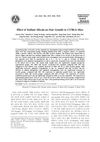
GFC injections significantly improved hair growth and quality with minimal side effects.
 December 2023 in “International Journal of Science and Research (IJSR)”
December 2023 in “International Journal of Science and Research (IJSR)” Herbal treatments are effective and preferred for hair loss with fewer side effects.
 September 2023 in “Asian journal of beauty & cosmetology”
September 2023 in “Asian journal of beauty & cosmetology” Lipids are important for healthy hair, but their exact role is not fully understood and needs more research.
 August 2023 in “International Ayurvedic medical journal”
August 2023 in “International Ayurvedic medical journal” Improper diet, lifestyle, and stress are major causes of hair fall.
 January 2023 in “Journal of pharmacognosy and phytochemistry”
January 2023 in “Journal of pharmacognosy and phytochemistry” Herbal home remedies can effectively treat hair loss with fewer side effects.
 June 2020 in “Applied sciences”
June 2020 in “Applied sciences” A new semi-automatic hair implanter could make hair transplants easier, more successful, and more accessible.
 November 2019 in “Harper's Textbook of Pediatric Dermatology”
November 2019 in “Harper's Textbook of Pediatric Dermatology” Understanding normal hair growth and loss in children is key to diagnosing and treating hair disorders.

Forensic hair analysis for drugs is now more reliable and accurate.
 January 2015 in “Springer eBooks”
January 2015 in “Springer eBooks” Hair health is influenced by genetics, aging, and environmental factors, with proper care needed to maintain it.

Hair restoration surgery has improved to transplant hair in natural groupings, but it's labor-intensive and can't fully restore normal hair density.
 January 1997 in “Elsevier eBooks”
January 1997 in “Elsevier eBooks” The document explains how shampoos clean, rinses condition, one-step shampoos offer convenience, and hair growth promoters aim to prevent hair loss, emphasizing the importance of scientific evidence for their effectiveness.
 January 1997 in “Elsevier eBooks”
January 1997 in “Elsevier eBooks” Hair and nails are skin parts that develop early and serve protective and functional roles.
 October 1987 in “Clinics in Dermatology”
October 1987 in “Clinics in Dermatology” Hair transplantation is beneficial if the right patients are chosen and the procedure is done carefully.
 58 citations,
September 2012 in “Dermatologic Clinics”
58 citations,
September 2012 in “Dermatologic Clinics” Male pattern hair loss caused by follicular miniaturization; early diagnosis and treatment can reduce psychological burden.
 23 citations,
January 2013 in “Indian Journal of Dermatology, Venereology and Leprology”
23 citations,
January 2013 in “Indian Journal of Dermatology, Venereology and Leprology” FPHL causes hair loss in women due to genetics and hormones; minoxidil and anti-androgens are treatments, and early intervention is advised.
 4 citations,
January 2010 in “Laboratory Animal Research”
4 citations,
January 2010 in “Laboratory Animal Research” Sodium silicate helped mouse hair grow similarly to a known hair growth treatment.
 2 citations,
August 2020 in “Clinical, Cosmetic and Investigational Dermatology”
2 citations,
August 2020 in “Clinical, Cosmetic and Investigational Dermatology” The hair-growth formula with L-cystine helps protect and grow hair cells.
 1 citations,
April 2024 in “Journal of Pharmaceutical and Pharmacological Sciences”
1 citations,
April 2024 in “Journal of Pharmaceutical and Pharmacological Sciences” The mouse models are effective for testing new hair loss treatments.
 August 2024 in “IAHS Medical Journal”
August 2024 in “IAHS Medical Journal” Low vitamin D and ferritin levels are linked to female hair loss.
 157 citations,
April 1994 in “Clinical endocrinology”
157 citations,
April 1994 in “Clinical endocrinology” Androgens can cause hair growth in some areas and hair loss on the scalp.
 66 citations,
June 2018 in “International Journal of Women's Dermatology”
66 citations,
June 2018 in “International Journal of Women's Dermatology” No cure for female pattern hair loss, but various effective treatments exist.
 25 citations,
March 2017 in “Journal of Dermatological Treatment”
25 citations,
March 2017 in “Journal of Dermatological Treatment” Platelet-rich plasma treatment for non-scarring hair loss shows mixed results and needs more research.
 11 citations,
September 1997 in “Archives of Dermatology”
11 citations,
September 1997 in “Archives of Dermatology” Reduced androgens linked to kinky hair disorder and hair loss; 5a-reductase inhibitors may help.

Avicennia marina extract and avicequinone C can potentially promote hair growth and treat hair loss by interfering with hair loss mechanisms and boosting growth factors.
 14 citations,
April 2005 in “Experimental Dermatology”
14 citations,
April 2005 in “Experimental Dermatology” Stressed fibroblasts greatly increase melanin production in hair, skin, and eye cells, mainly due to a growth factor called bFGF.
 June 2021 in “Journal of Emerging Technologies and Innovative Research”
June 2021 in “Journal of Emerging Technologies and Innovative Research” Rice water and hibiscus can help improve hair health and growth.

The new gel for hair loss is safe, effective, and reduces side effects.
 1 citations,
February 1993 in “Nursing Standard”
1 citations,
February 1993 in “Nursing Standard” Many drugs, not just chemotherapy, can cause reversible hair loss.
 October 2018 in “Ayurlog: national journal of research in ayurveda science”
October 2018 in “Ayurlog: national journal of research in ayurveda science” The review suggests that lifestyle, diet, and environment affect hair loss, and Ayurveda offers ways to maintain hair health.
 75 citations,
May 1986 in “Clinics in endocrinology and metabolism”
75 citations,
May 1986 in “Clinics in endocrinology and metabolism” Male hormones are important for hair and oil gland development and can cause conditions like excessive hair growth and acne.






























